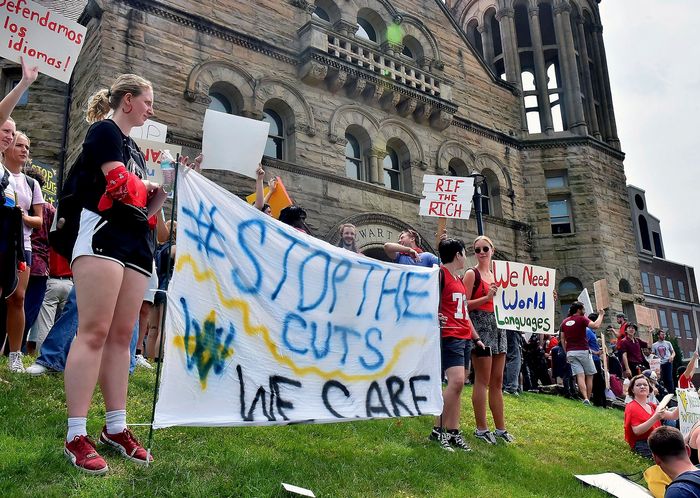West Virginia University (WVU), uncomfortably, has given us a sneak preview of what America has in its future.
A Wall Street Journal story on cuts to the University’s offerings reported that, “Dozens of faculty, students and alums, as well as a Morgantown, W.Va., city councilman, addressed the board Thursday during a three-hour public comment period, aiming to halt the remaining cuts.”
“Many speakers, their voices trembling with emotion or rising in anger, donned red shirts and bandannas in a nod to the labor movement and solidarity with the faculty. Some spoke of the opportunities West Virginia University provided them as low-income, first-generation college students. Others expressed concern that future graduates will struggle in the workplace without access to programs like Arabic language or public administration, and that the cuts would lead to an exodus of talent from the state.”
“This is a school and not a business, and these proposals that rip educational opportunities from students, and jobs from faculty and staff, will only weaken this institution,” said Christian Rowe, a graduate student in history. He said that cuts would make structural issues worse, and students would be deterred by “WVU’s lack of course offerings and respect for its community’s voices.”
“This is a school and not a business…” Every organization that has financial needs will be measured by money in, money out. If WVU cannot meet revenue needs then it has to reduce costs. Or, increase tuition or fees. Unlike our national government, West Virgina does not have a perpetual credit card.
But then if perpetual is definitional neither does the United States. It is this fact which frames the annual fiscal face-off over budgets and appropriations. A face-off that looks increasingly rabid.
America is not invulnerable. As our debt goes up our credit risk goes up and with it the cost of borrowing—a debilitating circle. Do we want more taxes? Higher rates? And if you say tax wealth then what will the rate have to be to catch up and combined with other taxes produce a balance? And crucially, how do you keep wealth from seeking more advantageous tax jurisdictions?
Or, do we want less of government and if so, what should we cut? And ultimately how much debt are we comfortable passing on to our children and grandchildren?
Right now, politics is mostly being fought along tribal lines. Barely civilized language is the patois as we talk about Trump’s outrages and Biden’s age and infirmities. And, it is hard to have a civil conversation about public affairs.
What we should be doing is what WVU is being forced to do. Its leadership now must ask, what courses should be dropped? What majors should be eliminated? And what about spending on extracurricular activities? This parade of questions needs to march through our federal government’s budget. And through our election cycle with its debates and interviews.
Biden and Trump and the range of wannabes need to be asked. Do not give them the easy out of squabbling about our latest emotional outburst. Make them answer our questions. The hard ones! Because we are in the middle of a national scandal—an assault on our children and grandchildren. And circumstantially we are infantilizing those who have been elected to make decisions that will preserve and protect the union. We hope.
Meet the Press, Joe
Kristen Welker, the newly minted moderator of Meet the Press, began her first show last Sunday with a long interview of former President Donald Trump. While he physically shows a few more years, he sounds like 2016. He was engaged and has even upped his game as he talks through accusatory questions. He has certainly had a lot of practice.
The takeaways from the interview were then discussed by a panel of three who said the expected. They noted inconsistencies, “falsehoods” and spent time talking about his ducking and dodging around whether abortion policy should be re-federalized.
But this panel of worthies failed on the central takeaway. He was engaged. He spoke quickly. The Donald Trump I watched will not win my vote, but neither will President Joe Biden. Unfortunately, Joe Biden cannot engage in the political repartee that is a feature of Presidential politics. And, international diplomacy. In the last election Covid was the cover to stay at home. It is unlikely to be an acceptable excuse in 2024.
President Biden’s allies spend much of their time targeting Trump or the possibility of a third Party that they claim will siphon more votes away from the President. They don’t get it. If Joe Biden is the nominee, Donald Trump has a good chance to win a second term.
Al Sikes is the former Chair of the Federal Communications Commission under George H.W. Bush. Al writes on themes from his book, Culture Leads Leaders Follow published by Koehler Books.



Alan Boisvert says
“Unfortunately, Joe Biden cannot engage in the political repartee that is a feature of Presidential politics. And, international diplomacy.”
Really? Did you see Biden’s address to the UN today? Any vote NOT for Joe Biden is a vote for autocracy. Hope you like living in that world. I know I won’t and I know you won’t. Watch what you say and who you vote for.